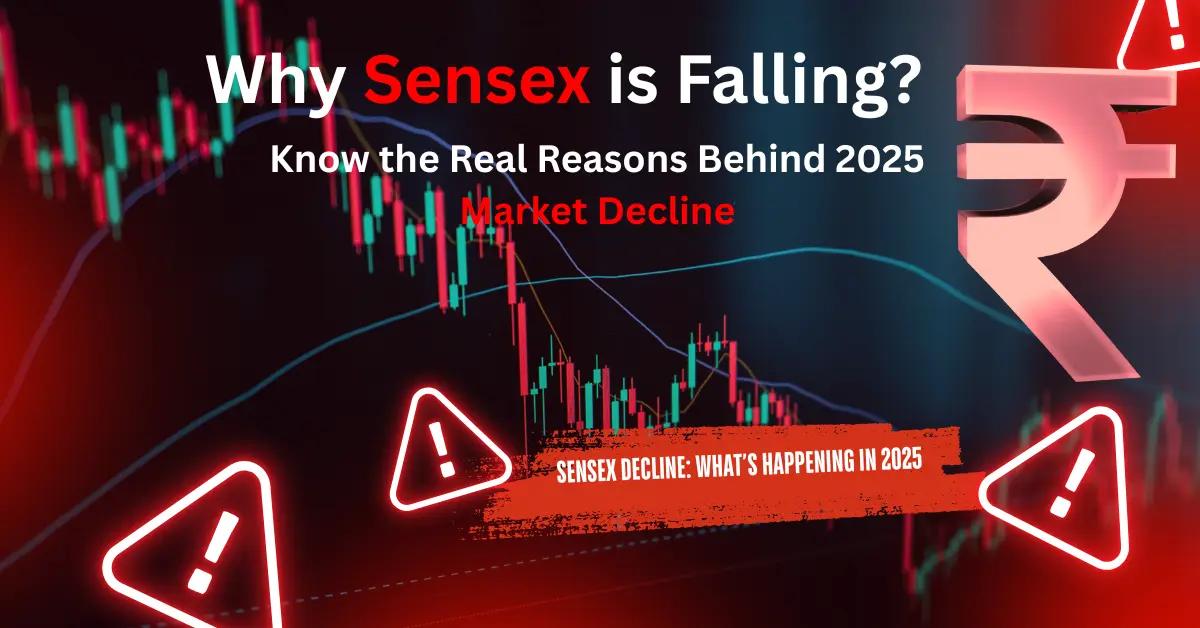The Sensex has been facing a downturn recently, leaving investors and market watchers puzzled. Understanding the reasons behind this fall is essential to making informed decisions for 2025. So, why Sensex is falling? Let’s dive deep into the factors driving the market decline.
Why Sensex is Falling: Key Reasons in 2025
Sensex, जो भारत का प्रमुख स्टॉक मार्केट इंडेक्स है, हाल ही में गिरावट का सामना कर रहा है। 2025 में Sensex के गिरने के कई कारण हैं, जिन पर हमें ध्यान देना चाहिए।
1. Global Economic Slowdown
One of the primary reasons for the falling Sensex is the global economic slowdown. International markets, especially in developed countries, are facing significant challenges. Trade wars, inflation concerns, and slowing growth rates have contributed to a negative sentiment in the stock market, affecting Indian indices like Sensex.
वैश्विक आर्थिक मंदी भी Sensex में गिरावट का एक बड़ा कारण है। दुनिया भर के विकसित देशों में आर्थिक चुनौतियां बढ़ रही हैं, जिनका असर भारतीय बाजार पर भी पड़ रहा है।
2. Domestic Inflation and Rising Interest Rates
Inflation has been rising in India, and this is causing concern for both investors and the government. The Reserve Bank of India (RBI) has increased interest rates to control inflation, which in turn has led to reduced liquidity in the market. High-interest rates discourage borrowing and spending, which negatively impacts the stock market.
भारत में बढ़ती महंगाई और बढ़ती ब्याज दरें बाजार को प्रभावित कर रही हैं। आरबीआई ने महंगाई को नियंत्रित करने के लिए ब्याज दरें बढ़ाई हैं, जो बाजार में तरलता को कम कर रही हैं।
3. Weak Corporate Earnings
Corporate earnings in India have shown signs of slowing down. Several key sectors such as IT, manufacturing, and banking have posted weaker-than-expected results, leading to a decline in investor confidence. As earnings are directly linked to stock prices, weaker earnings result in lower stock prices, contributing to the fall of Sensex.
भारत में कई कंपनियों के कमजोर कॉर्पोरेट अर्निंग हैं, जैसे आईटी, मैन्युफैक्चरिंग और बैंकिंग सेक्टर। ये आंकड़े निवेशकों की उम्मीदों के मुताबिक नहीं रहे, जिससे Sensex में गिरावट आई है।
4. Geopolitical Tensions
Tensions in regions like the Middle East, and ongoing conflicts in Eastern Europe, have global ramifications. These geopolitical factors contribute to uncertainty, causing foreign investors to pull back their investments, which impacts stock prices in India.
भूराजनीतिक तनाव जैसे मध्य-पूर्व और पूर्वी यूरोप में जारी संघर्षों का असर वैश्विक बाजार पर पड़ता है। इससे विदेशी निवेशक भारतीय बाजार से अपनी पूंजी निकालते हैं, जो Sensex को प्रभावित करता है।
5. Declining Foreign Investment
Foreign investors are becoming more cautious in emerging markets like India, owing to global uncertainty and economic volatility. When foreign institutional investors (FIIs) withdraw capital, it leads to a dip in market performance, directly affecting Sensex.
विदेशी निवेश में कमी आ रही है, और इसका कारण वैश्विक अस्थिरता और आर्थिक अनिश्चितता है। जब विदेशी निवेशक अपने निवेश को वापस लेते हैं, तो Sensex में गिरावट आती है।
6. Overvaluation of Stocks
Stock prices in India have surged in the past, leading to overvaluation in certain sectors. Overvalued stocks often experience corrections, as the market eventually realizes that the prices do not reflect the true value of the companies. This correction process is a key factor in the fall of Sensex.
भारत में स्टॉक्स की अधिकमूल्यांकन की स्थिति बन गई है। बाजार में सुधार के दौरान, कंपनियों की वास्तविक कीमत से ज्यादा कीमत वाली कंपनियों के स्टॉक्स गिर जाते हैं, जिससे Sensex में गिरावट आती है।
7. Political Uncertainty
Political stability plays a crucial role in investor confidence. Any signs of instability in the government or policy changes can have an immediate impact on the market. With 2025 bringing in a new phase for Indian politics, investor anxiety over potential changes can be one reason for the market’s fall.
राजनीतिक अस्थिरता भी एक कारण हो सकती है। यदि सरकार में कोई बदलाव या नीतिगत बदलाव होते हैं तो यह बाजार को प्रभावित कर सकता है।
8. High Oil Prices
Rising global oil prices have a significant impact on Indian markets. As India is heavily dependent on oil imports, an increase in oil prices leads to higher input costs for businesses. This can hurt profit margins, particularly in sectors like transportation and manufacturing, leading to a fall in Sensex.
तेल की बढ़ती कीमतें भारतीय बाजार पर भारी असर डालती हैं। जब तेल की कीमतें बढ़ती हैं, तो भारत में व्यापार की लागत भी बढ़ती है, जिससे कंपनियों का मुनाफा घटता है और Sensex में गिरावट आती है।
What Investors Can Do Amidst the Falling Sensex?
While the Sensex may be experiencing a decline, it’s important for investors to remain calm and consider the long-term picture. Here are some strategies that can help:
- Diversify Your Portfolio: Spreading investments across different asset classes can reduce risk.
- Focus on Strong Sectors: Certain sectors, like pharmaceuticals and technology, may still present opportunities.
- Look for Value Stocks: With prices falling, many stocks may now be undervalued. Picking up these stocks at a discount can lead to long-term gains.
- Stay Updated: Keep an eye on both domestic and international news, as factors influencing the market are dynamic.
निवेशकों को क्या करना चाहिए जब Sensex गिर रहा हो?
- अपने पोर्टफोलियो को विविध बनाएं: विभिन्न सेक्टरों में निवेश करने से जोखिम कम हो सकता है।
- मजबूत सेक्टरों पर ध्यान दें: फार्मास्युटिकल्स और तकनीकी क्षेत्र में अवसर हो सकते हैं।
- मूल्यवान स्टॉक्स ढूंढें: जब स्टॉक्स की कीमत गिरती है, तो कई स्टॉक्स अब undervalued हो सकते हैं। इन स्टॉक्स को कम कीमत पर खरीदने से दीर्घकालिक लाभ मिल सकता है।
- अपडेट रहें: घरेलू और अंतरराष्ट्रीय समाचार पर नज़र रखें, क्योंकि बाजार को प्रभावित करने वाले कारक गतिशील होते हैं।

